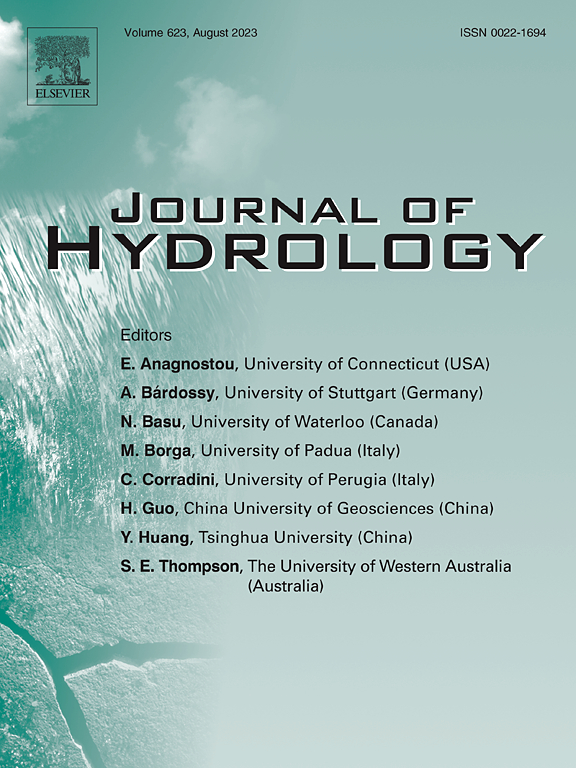梯级水库系统多库向单库防洪蓄能替代及水电优化的蓄能预留策略
IF 5.9
1区 地球科学
Q1 ENGINEERING, CIVIL
引用次数: 0
摘要
在多水库梯级系统中,洪水利用是平衡防洪和保水的关键,但传统的水库操作往往忽视了不同水库之间的蓄水量替代潜力。本研究建立了一个扩展的防洪水库替代模型,该模型考虑了上下游相互作用和中间水库调节,从而能够更精确地评估多个水库的防洪任务替代。本文以金沙江梯级和三峡工程为研究对象,系统地评价了在保证防洪安全的前提下,如何替代增建的防洪库容,以及如何在保证水电效益最大化的前提下储备库容。结果表明,上游水库可累计替代三峡工程设计防洪库容33亿m3,使三峡工程运行水位提高8 m,提高全系统发电量28亿千瓦时。此外,战略性的初始储备——特别是在白鹤滩分配较小的额外储备,在溪洛渡分配较大的额外储备——在不增加洪水风险的情况下进一步提高了水电产量。这些发现强调了利用“替代效应”来优化节水和发电的多水库协同作业的重要性。该研究为量化水库替代和指导初始蓄能保留决策提供了一个可推广的模型,为洪水资源利用、促进优化节水策略、提高多水库系统的水力发电提供了有价值的见解。本文章由计算机程序翻译,如有差异,请以英文原文为准。
Flood control storage substitution from multiple to single-reservoir and storage reservation strategy for hydropower optimization in cascade reservoir systems
Floodwater utilization is critical for balancing flood control and water conservation in multi-reservoir cascade systems, yet conventional reservoir operations often overlook the potential of storage substitution among different reservoirs. This study develops an extended flood control storage substitution model that accounts for both upstream–downstream interactions and intermediate reservoir regulation, thereby enabling a more precise assessment of flood control tasks substitution across multiple reservoirs. Focusing on the Jinsha River cascade and the Three Gorges Project (TGP), we systematically evaluate how additional flood control storage can be substituted and how to reserve storage to maximize hydropower benefits while maintaining flood safety. Results show that upstream reservoirs can collectively substitute as much as 3.3 billion m3 of TGP’s design flood control storage, raising TGP’s operating water level by up to 8 m and boosting system-wide power generation by 2.8 billion kWh. Moreover, strategic initial storage reservation—particularly assigning smaller additional storage to Baihetan and larger to Xiluodu—further enhances hydropower output without increasing flood risk. These findings underscore the importance of coordinated multi-reservoir operations that harness the “substitution effect” to optimize water concervation and electricity generation. By offering a generalizable model for quantifying reservoir substitution and guiding initial storage reservation decisions, this study provides valuable insights into floodwater resource utilization, promoting strategies to optimize water conservation, improve hydropower generation in multiple reservoirs systems.
求助全文
通过发布文献求助,成功后即可免费获取论文全文。
去求助
来源期刊

Journal of Hydrology
地学-地球科学综合
CiteScore
11.00
自引率
12.50%
发文量
1309
审稿时长
7.5 months
期刊介绍:
The Journal of Hydrology publishes original research papers and comprehensive reviews in all the subfields of the hydrological sciences including water based management and policy issues that impact on economics and society. These comprise, but are not limited to the physical, chemical, biogeochemical, stochastic and systems aspects of surface and groundwater hydrology, hydrometeorology and hydrogeology. Relevant topics incorporating the insights and methodologies of disciplines such as climatology, water resource systems, hydraulics, agrohydrology, geomorphology, soil science, instrumentation and remote sensing, civil and environmental engineering are included. Social science perspectives on hydrological problems such as resource and ecological economics, environmental sociology, psychology and behavioural science, management and policy analysis are also invited. Multi-and interdisciplinary analyses of hydrological problems are within scope. The science published in the Journal of Hydrology is relevant to catchment scales rather than exclusively to a local scale or site.
 求助内容:
求助内容: 应助结果提醒方式:
应助结果提醒方式:


